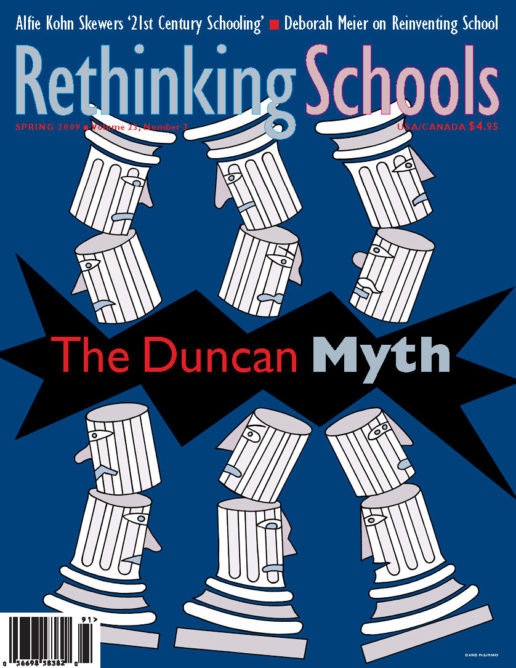Preview of Article:
Knock, Knock: Turning Pain into Power
Illustrator: Scott Bakal
Too often today, schools are about standards and common curriculum: Scarlet Letter and Huck Finn first quarter, move on to Great Gatsby … And too often, I get caught up in that land too. Then my heart gets cracked open by students, and I remember that first I must teach the child who is in the class. By structuring a curriculum that allows room for students lives and by listening to their stories, I can locate the right book, the right poem that turns pain into power—while I teach reading and writing. Unless I consciously build these opportunities into the curriculum, there is little hope of getting authenticity from students.
Daniel Beaty, poet and playwright, came to life for me one New Year’s Eve when my husband, Bill, and I watched hour after hour of the HBO show “Def Poetry Jam.” I fell in love with many poets that night, but when I watched Daniel Beaty perform “Knock Knock,” I knew I was witnessing a poet whose performance and words would inspire my students. I bought the “Def Poetry” DVD, transcribed the words, and carried Beaty with me to class. Partly autobiographical, the poem speaks directly to many of my students because Beaty’s drive-home message in everything he does is that in order to heal ourselves, our society, and our world, we must turn our pain into power. [Beaty’s “Def Poetry Jam” performance of “Knock Knock” is posted on YouTube: http://www.you tube.com/watch?v=nktBsI0PYPs.]
I taught the poem to several classes at Portland’s Jefferson High School days before Barack Obama was elected president. I’d spent 24 years teaching high school language arts at this predominantly African American school, and I returned this year to work with the faculty. I left each class in tears because when poetry, like Beaty’s, touches students’ lives in real ways, I am reminded of both the pain and the hope that schools harbor.

